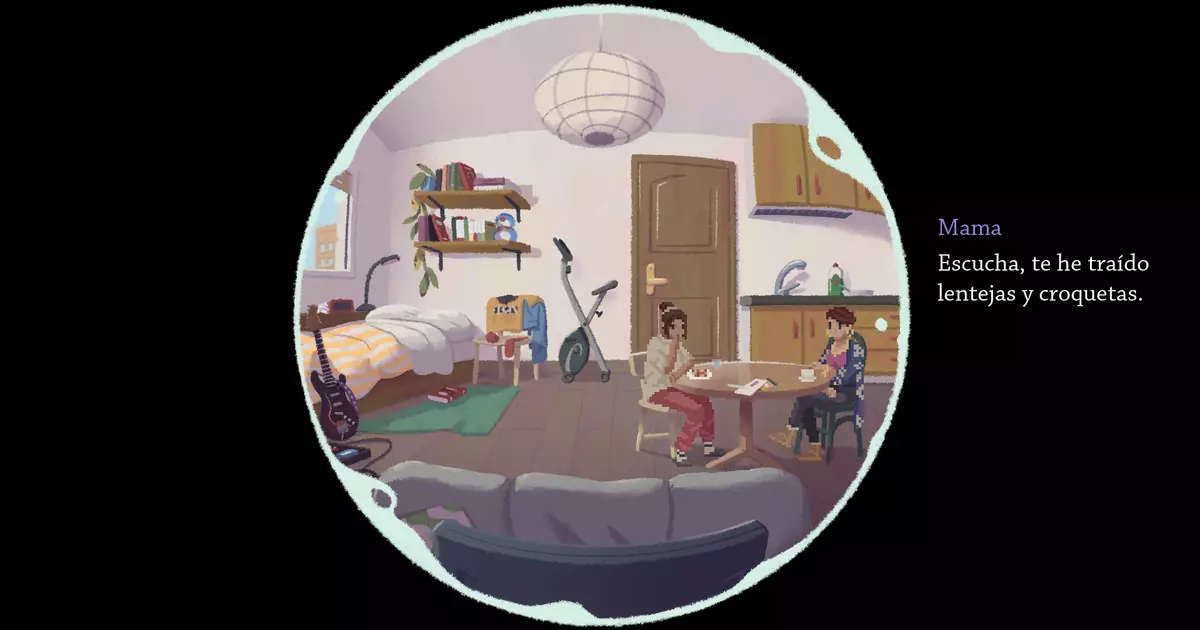“Vendrán Las Aves,” or “The Birds Will Come,” is a unique indie game that offers a quiet yet profound interpretation of the struggle against burnout. Developed by Francisco Riolobos, Chuso Montero, and Deconstructeam, this Valencia-based team builds on their reputation from previous titles such as “The Red String Club” and “The Cosmic Wheel Sisterhood.” As a product of a game jam, the game stands as a testament to the power of creativity within constraints, but does it truly encapsulate the complexities of mental health recovery?
At its core, “Vendrán Las Aves” adopts a tamagotchi-esque approach, providing players with a perspective on an individual’s life within the confines of a one-room apartment. The protagonist has recently escaped from a challenging work situation and has let spontaneity take hold by purchasing a guitar. However, the duality of this act is palpable; the excitement of self-expression clashes with an overwhelming sense of fatigue. This juxtaposition speaks volumes about the internal turmoil many experience when trying to navigate their passion amid burnout.
The gameplay mechanics revolve around daily resource management, representing the limited energy the character must allocate to various activities—eating, watching TV, or doing laundry. Players must carefully distribute these energy points to foster an environment in which the character can regain both their vitality and creativity. It’s an interesting abstraction of a very real struggle: the fight to balance self-care with daily responsibilities when one is feeling drained. This method encourages players to consider their own time and resource management while facing similar struggles.
In some ways, the design can feel reductive. By reducing the complexities of mental stagnation and emotional exhaustion to a point system, the game might risk oversimplifying the emotional depth of burnout. Yet, the game’s mechanics operate on a more profound level for anyone who has ever measured their worth or capacity to cope by how much they can achieve within a day. The game serves not only as entertainment but also provides a reflective mirror for players, prompting them to consider their own methodologies for tackling life’s demands.
While the protagonist grapples with their challenges, the subtle undertone of seeking and accepting help from others is a poignant inclusion. When mom stops by with a Tupperware of food, it’s an invitation for players to acknowledge that the journey to recovery isn’t solitary. This element is critical; it conveys a universal message that during periods of crisis, vulnerability and interdependence are strengths rather than weaknesses.
As players interact with the character, they witness moments of human connection that can rejuvenate, even if only incrementally. The act of sharing physical nourishment becomes a metaphor for the intangible support we often overlook during darker days. The sense of community rings true—not every day will be marked by triumphs, but external support can provide the necessary sustenance for the journey ahead.
While the gameplay mechanics draw from the nostalgia of tamagotchi games, comparisons with titles like Zoe Quinn’s “Depression Quest” are inevitable. “Vendrán Las Aves” invites players to engage emotionally, functioning as a narrative experience rather than straightforward gaming. However, the relationship between digital pets and emotional well-being bears reflection—traditionally, real-world connections have been vital components of mental health.
The conclusion of the game, while optimistic, does not wrap everything up neatly. Acknowledging that the process of recovery is an ongoing journey rather than a single endpoint reinforces the game’s intimate portrayal of personal struggles. It lacks a definitive resolution, mirroring real life where challenges can resurface unexpectedly.
In sum, “Vendrán Las Aves” may not serve as a comprehensive guide to mental health, but its narrative authenticity and immersive mechanics shine a light on the delicate balance of acknowledging one’s struggles while fostering hope. This gentle exploration of burnout recovery can resonate with anyone who navigates the complex emotions of life’s highest peaks and lowest troughs. For those looking for further insight into mental well-being, resources are available through organizations like Mind UK, which can guide individuals toward meaningful steps for recovery. Ultimately, “Vendrán Las Aves” is a beautiful invitation to seek comfort, connection, and acceptance of the more profound aspects of our human experience.

